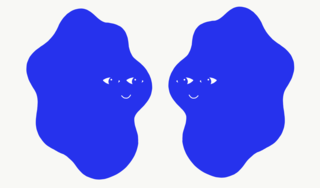Attention
Informavore Doppelgangers: Your Phenomenal Duplicate
Part 2: "What is it like to be you?" The answer gets ghostly.
Posted September 15, 2020
In a previous post, I discussed the Big Other. We will return to that and the politics of attention surveillance soon. For now, let’s take a detour from these political issues and return to the kind of “encounter” with informavores on which we focused before. In a previous version of these encounters, we confronted a character called “Zombie-you.” This post introduces another version of this character, which had been developed by philosophers of mind in order to defend their views about consciousness.
As a refresher from the previous post, this Zombie-you is supposed to be you — your body in all its biochemical complexity, molecule by molecule, with the inclusion of all the history of information processing in your brain (a “merely physical,” instantaneous copy of you without this information, might actually be a different character!). Zombie-you is you “minus consciousness” or you minus “what it is like to be you." Whether this makes any sense is beyond the point. In philosophy, one can argue based on thought experiments, even if these sound entirely preposterous to the ears of any rational person.
Zombie-you is one of the main characters in the argument against physical views about consciousness, which find physical theories on conscious experience inadequate in explaining it fundamentally. This is also known as the “hard problem” of consciousness.
Our new character is also based on a thought experiment. In a way, this character is the opposite of Zombie-you. This version is a phenomenal duplicate, let’s call her “Phenomenal-you,” and will also be a bit of a challenge to explain. But here are the basics. Suppose you are in a permanent hallucinatory situation. It could be that your entire life is a dream created by an evil demon and that you only exist in the farcical creation of the demon, without a real “world,” without any physical reality. Your consciousness, then, is not dependent on your physical interactions or information processing by your brain. This scenario is based on the skeptical and methodical doubts pioneered by René Descartes in his deeply influential Meditations on First Philosophy.
Or you could be in the Matrix, also an influential story that challenged the imaginations of many. Like Neo, you would be conscious of decisions, actions, plans, but they are only happening as bits of information in a masterpiece program, or a simulation, completely unrelated to any physical reality concerning your body, biology, neural structure, or function. You live only a theatrical life. But—and this is the key point— there is still something it is like for you to be in the matrix or in the evil-demon’s dream, isn’t there? So this “what it is like to be you” could be after all the real you—your biological and neurological makeup and information can be seen as just mechanical contingences.
This was in fact Descartes’ conclusion. “I think therefore I am” means that there is something it is like for you to have these thoughts in the matrix (the same as in dreams), so you are identical to your conscious thinking self, as opposed to anything material, including your body. Descartes famously went beyond this claim by defending what we now call “dualism,” which is the view that the mind is completely independent in reality from the physical world. Phenomenal-you is real and causes things to happen, but is entirely not physical.
On a different, illusory account, you introspectively identify with your thoughts, but when it comes to the real universe, your conscious thoughts are illusory, precisely because they are not material. They are a kind of ephemeral glow—or better, a story you tell yourself and others about yourself. Such stories don’t really “exist” but they do fundamentally depend on the physical world for them to make any sense. So there is an important way in which your body is you—whatever story you end up saying about yourself, it will involve what your body does.
Descartes, however, made the radical claim that if you judge that you are your body, or that the material biological world is necessary for your existence as a conscious “thinking thing,” then you are making a fundamentally irrational mistake. This claim argues that the mind is a substance. What this means is that your mind is a non-material, non-observable, non-physical (not regulated by any laws of physics), indivisible, and fundamental aspect of the universe. Not only that, as mentioned, your mind can cause things to happen (this extra claim about causation is what distinguishes dualism from so-called “epiphenomenalism”). Descartes claimed this to be true, even while endorsing the mechanical view of the universe, which, at the time was new and controversial.
This conscious thinking self is what contemporary philosophers call the phenomenal self, and your phenomenal duplicate, the Phenomenal-you, is the copy of this immaterial self. Your phenomenal duplicate is now used to argue that the contents of the mind depend on the identical awareness you and your duplicate have, and from there, that what you believe is equally well justified, even though all the beliefs concerning the external world of your phenomenal duplicate are false (remember that she is in the matrix and lacks physical interactions!). What could justify this deeply internalist stance that leaves no role for the information of the world when it comes to our conscious minds? According to the contemporary proponents of these Cartesian ideas, it is the hardness of the hard problem—the fact that your thinking conscious mind is not material and that what justifies what you think depends on what it is like for you to think these thoughts, not whether they are true (there can, after all, be justified belief without guaranteed truth).
So this is how we end up with “Phenomenal-you,” or your conscious self “minus” your physical structural and functional aspects—as a reminder, this includes your body and the information stored in your very physical brain and biologically instantiated behavior. (This is essentially the reverse of Chalmers’ zombie thought experiment.)

Now one has to wonder if Phenomenal-you could really lack any of the functional aspects of the information stored in your brain and still be you. Interacting with the world requires some sort of information processing (as we often argue, something that attention does for us), and this is where the problem arises in this thought experiment. Where is this information stored or processed?
Moreover, isn’t consciousness informative because it acquaints us with the physical world? What “other” world is there to be acquainted with? Shouldn’t this material world of ours matter for providing the contents of conscious information? And even if we are indeed phenomenal, ethereal creatures, shouldn’t the fact that our body is very worldly somehow determine what kind of information is stored in our ethereal minds? Isn’t your “story” about your behavior and interactions with the material world, and isn’t your behavior physical or at least informational and functional in a way that makes some sense of the fact that you never leave your body?
Phenomenal-you seems to break down at this point in the thought experiment. Nevertheless, thinking about this can give some insight into how brain and mind interact (or, attention and consciousness).
On a more playful note, what would it be like to encounter these duplicates of you, Zombie-you and Phenomenal-you? Would you like them? Would they be heroes or villains? Would they have the same moral value as you? If phenomenology is the sole basis of your moral worth, shouldn’t the fact that you have a meat-based body reduce a bit your moral worth compared to a strictly ethereal creature like Phenomenal-you? Could you become their friend, or mentor, or enemy? This and other curiosities from the consciousness world lie ahead.
Carlos Montemayor & Harry H. Haladjian




